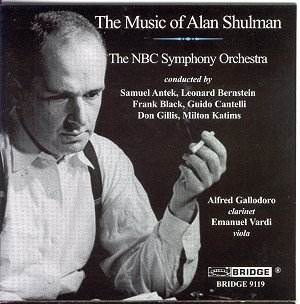Alan Shulman was trained as a cellist and studied
with Felix Salmond and Emanuel Feuermann. He also studied composition
with Bernard Wagenaar and Paul Hindemith. As a professional cellist
he played in the NBC Symphony Orchestra until 1954 and was a co-founder
(among others, with his brother Sylvan) of the Stuyvesant Quartet.
He stayed with the Sylvan from 1938 to 1954. He was a member of
the Kreiner String Quartet from 1935 to 1938. Later he played
with the Philharmonic Trio (from 1962 to 1969) and with the Haydn
Quartet (from 1972 to 1982). He also found time for extensive
teaching, composing and arranging activity. Besides a number of
lighter works, some of which are represented here, he composed
several large-scale and substantial works such as a Cello
Concerto written in 1948 for Leonard Rose who premiered
it with the New York Philharmonic under Mitropoulos.
A number of his works have been regularly played
and broadcast throughout the United States, generally played either
by the NBC Symphony Orchestra or the NBC Concert Orchestra. The
present disc features several orchestral works written between
1938 and 1954 of which the most substantial is undoubtedly his
Theme and Variations for viola and orchestra which
was first performed by Emanuel Vardi and the pianist Vivian Rivkin.
Toscanini was present at the first performance and thought highly
of the piece, which probably encouraged Shulman to orchestrate
it. The orchestral version was again first performed by Vardi
with the NBC Symphony Orchestra conducted by Frank Black. This
piece also impressed William Primrose who put it in his repertoire
and even toured North and South America with it in 1944-1946.
In 1954 Shulman made another version for viola, harp and strings
which he is said to have preferred to the full orchestral version
heard here. In any case, this is a wonderful piece of music, sometimes
redolent of Bloch, that has apparently remained a favourite with
violists since there exist two modern recordings of it (in 1989
by Crystal Records and, as recently as 2000, by Cedille), neither
of which I have heard.
Most other pieces here are comparatively short
and generally lighter in mood. All are superbly crafted by a composer
who obviously had a thorough knowledge of the orchestra (from
the inside, as it were) and who knows what to say and how to say
it best. The somewhat earlier A Nocturne for Strings,
completed in 1938, is a more serious work which inevitably calls
Barber’s popular Adagio for Strings to mind. I hasten
to say, that this is an entirely personal piece in its own right.
Though it has been recorded before, in 1945, and later released
as a 10 inch LP issued by Columbia, this really beautiful work
has remained too rarely heard since. This old though still quite
satisfying recording will help restoring it to the catalogue and
prompt new recordings. It clearly deserves to be as popular as
Barber’s piece.
Benny Goodman invited the Stuyvesant Quartet
to be "Homecoming Stars", a weekly feature of his summer
radio program. He wanted to perform a movement from Mozart’s Clarinet
Quintet with them. Shulman was not willing to make a long trip
to play just five minutes of Mozart and he decided to compose
a short work for clarinet and string quartet Rendezvous
with Benny which later became Rendezvous for Clarinet
and Strings which is what we hear on this disc.
In 1949, the NBC Symphony Orchestra conducted
by Leonard Bernstein performed at a dinner in honour of the President
of Israel. Both The Star-Spangled Banner and Hatikvah
were to be performed, the latter in an arrangement by Kurt Weill
to which Bernstein objected. Shulman offered to make a new arrangement
for the event. The attractive and brilliantly orchestrated Waltzes
for Orchestra also date from 1949. Lighter stuff, surely,
but superbly done and well worth hearing. This is light music
of the highest order as is the fine A Laurentian Overture
of 1951. Shulman sent the score to Cantelli who commented favourably
upon it and decided to programme it at the New York Philharmonic
concerts. He conducted the first performance with the Philharmonic
in 1952. This short piece is another brilliant display of effective
scoring. The music has a great freshness and moves along in an
overtly outdoor mood. Very enjoyable, and one can but wonder why
music such as this has completely disappeared from the repertoire.
In 1954 Shulman composed a series of short light
works for string orchestra, of which two are recorded here: Minuet
for Moderns and The Bop Gavotte. The titles
are clear enough and do not call for many further comments. This
is the kind of stuff that might feature in American String
Miniatures, if such a disc was ever to appear some day. Delightful,
unpretentious and again superbly crafted music of great melodic
appeal, with more than a touch of humour.
Shulman’s music is new to me. Listening to this
beautifully produced disc made me wonder at the complete neglect
in which his music is presently held. This disc will put his name
again in the catalogue and hopefully prompt conductors and recording
companies to look at it again. These old recordings inevitably
bear their age but the recorded sound is more than acceptable
throughout, so that one has a reasonably good idea of what Shulman’s
music sounds like.
Hubert Culot

![]() for
details
for
details ![]() Emanuel Vardi (viola)a;
Alfredo Gallodoro (clarinet)b; NBC Symphony Orchestraabcdef;
NBC Concert Orchestrag; Frank Blacka, Samuel Antekb,
Milton Katimsce, Leonard Bernsteind, Guido Cantellif,
Don Gillisg
Emanuel Vardi (viola)a;
Alfredo Gallodoro (clarinet)b; NBC Symphony Orchestraabcdef;
NBC Concert Orchestrag; Frank Blacka, Samuel Antekb,
Milton Katimsce, Leonard Bernsteind, Guido Cantellif,
Don Gillisg ![]() BRIDGE 9119 [48:23]
BRIDGE 9119 [48:23]